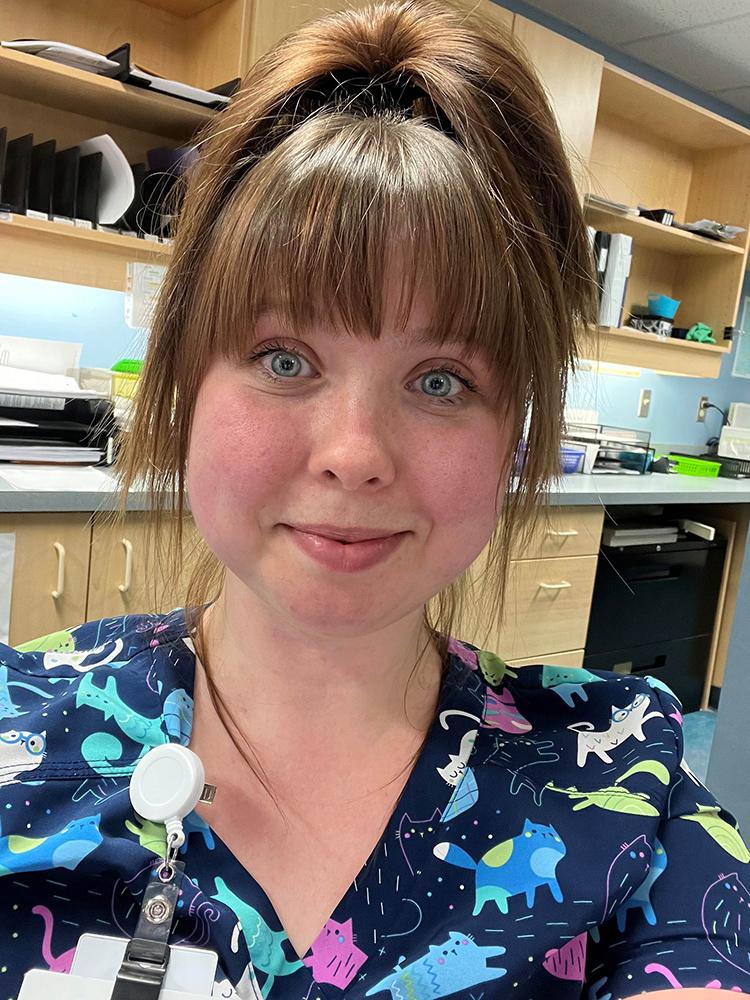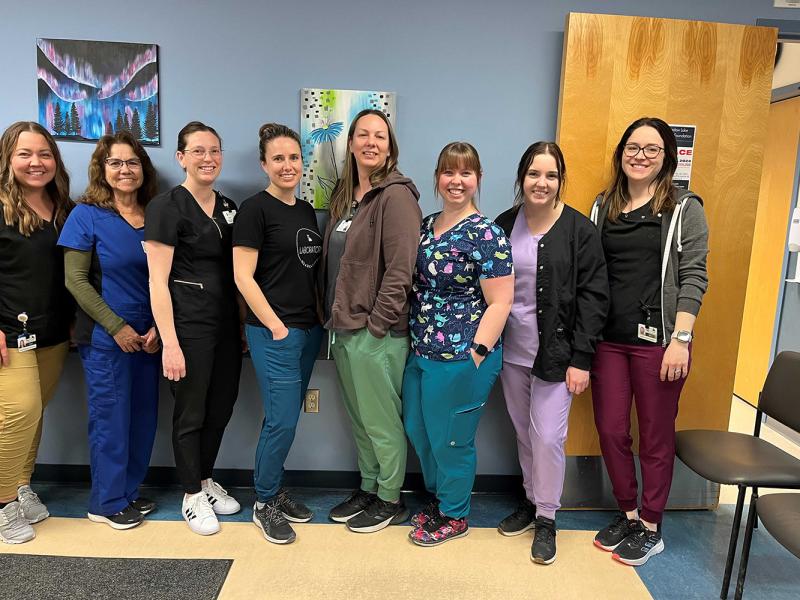Ariana Arnold Career Spotlight
Ariana Arnold is a Medical Laboratory Technologist (MLT) working at the Meadow Lake Hospital who graduated from Saskatchewan Polytechnic in April 2021. Check out her experience with the Saskatchewan Health Authority (SHA) below:
What are you responsible for as a Medical Laboratory Technologist (MLT)? Please describe a typical day for yourself.
Did you know across Canada there are approximately 1.2 million lab tests run every day? 500 cases of cancer are diagnosed each day, 2,000 units of donated blood are needed every day. Medical Laboratory Technologists are the heroes behind the scenes. To start our day we perform maintenance and run quality control on all our analyzers daily to ensure everything is working correctly to ensure we are giving nurses and doctors accurate results to help them in treating or diagnosing their patients. You spend your day working in the lab on what we call “a bench”, you spend your day taking care of that area. Since we are a core lab, your bench is a broad spectrum of tests. One day you might be chemistry, so you’ll be in charge of all chemistry tests for the day, and performing maintenance on all the chemistry analyzers. In larger facilities, since they have such a high workload and have more specialized testing, they are more specific on their benches, you will specialized in one department ie. Hematology. For example, you might be running coagulation testing(blood clotting), another day you might be reviewing slides on a microscope. In smaller facilities we will collect blood from patients, and access specimens, whether it be blood, urine, feces, swabs, etc. and either perform the required tests at our site, or prepare them to be sent to a larger lab for more specialized testing, such as Roy Romanow Provincial Lab in Regina. In our lab we perform testing in chemistry, hematology, urinalysis, basic transfusion medicine and we also perform blood collections for our inpatients, the emergency department, and the community. No two days are the same, no two patients are the same.
How is your work-life balance as an Medical Laboratory Technologist? Please compare your current experience with other jobs you have had in the past.
We work shift work, so it can be nice to get time off during the week when others are at their “9 to 5s” are at work. Night shifts can be hard, physically and mentally but you get a couple of days off to sleep and recharge before going back to day shifts. In our rural setting we work mostly 7:00/7:30am to 4:00pm, every day one technologist works an evening shift from 3:30pm to midnight and then is on call for the night; meaning we are called into work for urgent cases that cannot wait until morning. Some nights you’re at the hospital more than you’re at home, it might seem like every time you get home and fall asleep you’re getting another call. It can be very tiring, but your paycheque will thank you later. There are other MLT jobs in different areas that could allow you to work Monday to Friday day shifts, such as a supervisor role, ie. Tech II or Tech III, or more specialized testing, ie. Flow Cytometry. Overall the work-life balance is good but it can take some getting used to working in shifts.
Have you always wanted to be an Medical Laboratory Technologist? Tell us more about your career path to becoming a MLT!
No, honestly like a lot of people I had no idea what I wanted to do after high school, so I worked for a few years doing different things. My family encouraged me to get into health-care and showed me the different programs at Saskatchewan Polytechnic. I looked into them and was torn between MLT and Medical Radiation Technologist (MRT), so I applied to both. I got into MLT and I love it, it’s where I’m meant to be. I did all of my schooling, including my clinical rotation in Saskatoon. It was nice to have clinical in Saskatoon and be able to work in each of the three hospitals to see how different they all are. After I graduated in April of 2021 I took a position in North Battleford for about a year and a half, realized how much I like working rural and now I’m in Meadow Lake.
Are there opportunities to further your career as a Medical Laboratory Technologist?
Yes! We are always learning new things and discovering more about what causes illness and how we treat it early. For example, Prostate stimulating antigen test for detecting prostate cancer, Carcinoembryonic antigen for detecting colorectal cancer, antinuclear antibody test for detecting lupus. In the years to come who knows what other markers/antibodies researchers will discover, so that we can perform testing on to help detect and treat illnesses early on.
Since the COVID-19 pandemic our facility now has a GeneXerpt analyzer, which uses a polymerase chain reaction (PCR) test to detect COVID-19, Influenza, and at our facility we can now do Tuberculosis tests on it as well.
There are a number a ways a MLT can further their career, you can move into a supervisor role as a Tech II or Tech III. If you’re at a larger facility you could move into a more specialized role, like parasitology, mycology, computer systems, flow cytomerty, etc. You can become a teacher at one of the schools. There are also opportunities to work for the companies that supply the analyzers as support tech.
Do you have any advice for students or new graduates looking to pursue a career as a Medical Laboratory Technologist? Are there specialty areas that are in more demand than others?
My advice for new grads and students is keep your mind open. Just because you loved the theory of one topic doesn’t mean you’ll love it in clinical. Just because you loved it in clinical doesn’t mean you’ll love it the most when you’re working. Try out different areas when you’re working, try going rural to practice more of your skills when you’re first starting out. Own your mistakes. Learn from them. Read the Standard Operating Procedures (SOPs), ask questions when you’re unsure. Don’t forget, that tube of blood isn’t just a tube of blood, it’s represents a person.
I feel like more rural sites are needing MLTs, I think it’s a great opportunity to try moving to a smaller area and seeing what it’s like. You’ll practice a wide variety of your skills, you’ll more closely with doctors, nurses, Respiratory Therapists (RTs), medical imaging, you’re a part of the team! There’s potential for grants and recruitment incentives for students interested in working in rural and remote communities so that's a nice bonus.
What is the number one thing you love about being a Medical Laboratory Technologist?
I love that every day is different, you never know what kind of samples you’ll receive, if you’re the collector or working alone you never know what will come into the Emergency Room (ER). One thing I personally love is looking under the microscope at slides and identifying cells. Working rural you see the patients and hear their stories, while you will likely never seen your patients if you’re in a larger facility, don’t forget what you do makes a difference to them, to their treatment.




